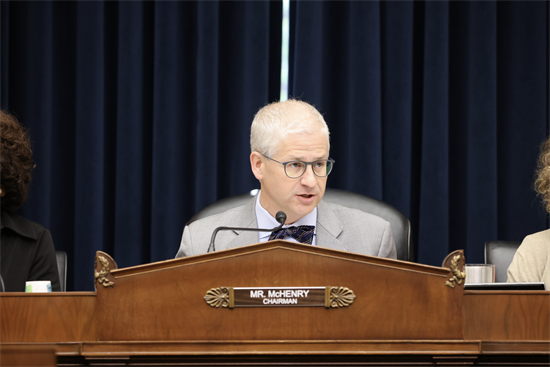House Financial Services Committee Reports Digital Asset, ESG Legislation to Full House for Consideration
Washington,
July 27, 2023
Today, the House Financial Services Committee passed seven pieces of legislation out of Committee that establish a regulatory framework for payment stablecoins, protect self-custody for digital assets, overturn the CFPB’s disastrous small business lending data collection rule, and combat the influence of ESG initiatives in our financial markets. Included among this legislation is the Clarity for Payment Stablecoins Act, introduced by Chairman Patrick McHenry (NC-10), which recognizes several regulatory paths for approving and regulating stablecoin issuers while ensuring robust protections for consumers through necessary federal guardrails, passed by a bipartisan vote.
More information on all seven bills reported out of the Financial Services Committee can be found below including Member remarks in support of their legislation:
H.R. 4766, the “Clarity for Payment Stablecoins Act of 2023," offered by Chairman McHenry, provides a clear regulatory framework for the issuance of payment stablecoins. The bill protects consumers by establishing necessary federal guardrails, while at the same time fostering innovation in the U.S. through a tailored approach for new entrants into the marketplace.
Watch Rep. McHenry’s remarks in support of H.R. 4766 here.
H.R. 4841, the “Keep Your Coins Act of 2023,” offered by Rep. Warren Davidson (OH-08), addresses one of the key risks identified by the FTX failure. It would ensure that consumers are allowed to maintain custody of their digital assets in self-hosted wallets. This is a key tenet of blockchain technology because it allows consumers to avoid the risks associated with centralized, third-party custody.
Watch Rep. Davidson’s remarks in support of H.R. 4841 here.
H.R. 4790, the “Guiding Uniform and Responsible Disclosure Requirements and Information Limits (GUARDRAIL) Act of 2023,” offered by Rep. Bill Huizenga (MI-04), will bring meaningful changes to SEC disclosure regulations by ensuring companies are only required to disclose material information and requiring the SEC to publicly list and explain any non-material disclosure demands. It also establishes a Public Company Advisory Committee within the SEC to enhance investor protection and market fairness. Lastly, the bill mandates an SEC study to assess the potential impact of the Corporate Sustainability Due Diligence Directive (CSDD) and Corporate Sustainability Reporting Directive (CSRD).
Watch Rep. Huizenga’s remarks in support of H.R. 4790 here.
H.R. 4767, the “Protecting Americans’ Retirement Savings from Politics Act,” offered by Rep. Bryan Steil (WI-01), improves the shareholder proposal and proxy voting process to prioritize corporate growth over partisan political issues. It raises resubmission thresholds for shareholder proposals, invalidates certain SEC regulations and guidance, limits the SEC’s ability to define a “major policy issue,” and allows companies to exclude environmental, social, and political proposals. Additionally, the bill provides transparency and accountability to the proxy advisory industry, prohibits robovoting, and requires proxy advisory firm clients to issue annual public reports on their proxy voting. Finally, the bill requires large asset managers to conduct economic analysis when voting against board recommendations and requires investors to consent to the use of non-pecuniary factors in decision-making.
Watch Rep. Steil’s remarks in support of H.R. 4767 here.
H.R. 4823, the “American Financial Institution Regulator Sovereignty and Transparency Act,” offered by Rep. Barry Loudermilk (GA-11), increases transparency and congressional oversight of federal banking regulators and their interactions with international organizations, particularly non-governmental organizations, to limit their influence on U.S. banking policy. The bill also bolsters the political independence of federal banking regulators by requiring the prudential regulators to report to Congress when implementing non-binding recommendations from Executive Orders or the Financial Stability Oversight Council. Finally, the legislation will remove the designation of a member of the Federal Reserve Board as Vice Chairman for Supervision and make conforming amendments in the Federal Reserve Act.
Watch Rep. Loudermilk’s remarks in support of H.R. 4823 here.
H.R. 4655, the “Businesses Over Activists Act,” offered by Rep. Ralph Norman (SC-05), clarifies that the SEC does not have the power to regulate shareholder proposals through Rule 14a-8 and prevents the SEC from forcing companies to include or discuss shareholder proposals. Its goal is to limit the SEC’s control in this area and emphasize the role of state regulations in governing shareholder proposals.
Watch Rep. Norman’s remarks in support of H.R. 4655 here.
H.J. Res. 66, a joint resolution disapproving the rule submitted by the Consumer Financial Protection Bureau relating to “Small Business Lending Under the Equal Credit Opportunity Act (Regulation B)," offered by Rep. Roger Williams (TX-25), would nullify the CFPB’s final rule implementing Section 1071 of the Dodd-Frank Act which would mandate the collection and reporting of demographic data on small business loan applicants.
Watch Rep. Williams’ remarks in support of H.J. Res. 66 here.
###
|


